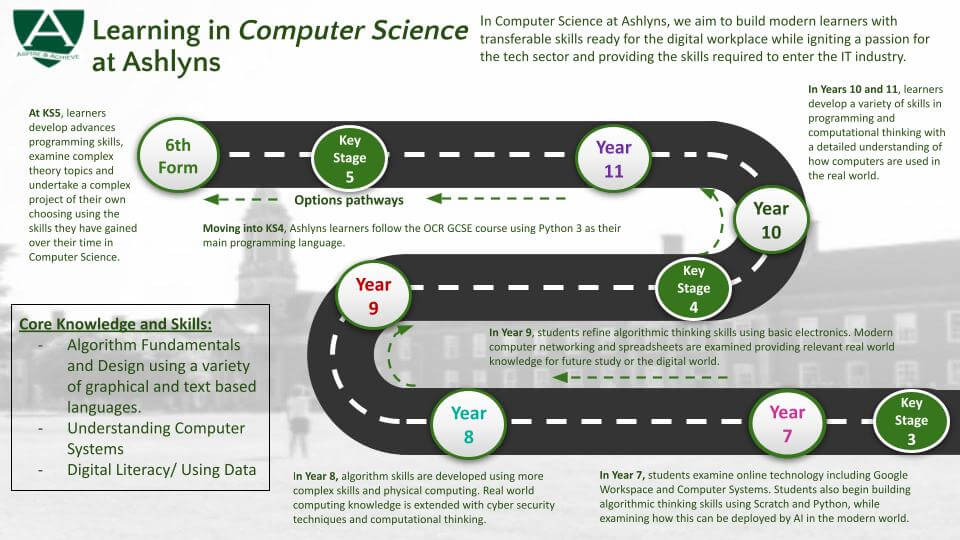Computer Science
Computers, ICT and technology play an important role in a student’s life, both in and out of the classroom. Ashlyns school prides itself on offering an open approach to using technology in a thoughtful and progressive manner. Through offering students the ability to use technology in all aspects of the curriculum, we aim to equip students for an increasingly online world.

Through their work in the Computer Science (CS) department, students are encouraged to develop informed, intelligent and confident attitudes to computers and technology, so that they will develop abilities which, as well as being of value in school, prepare them for their further education and careers. Cross-curricular links with Computing are strongly encouraged and many lessons in other subjects either take place in our shared Computing suites or in the departments themselves.
Key Stage 3
Our Key Stage 3 curriculum is built around three Areas of Focus which weave through all three years of study. These highlight the areas of knowledge students develop; Digital Literacy/Using Data, Understanding Systems and Algorithm Fundamentals and Design.
Year 7
Autumn 1: Working with Google Workspace
Autumn 2: Computer Crime and Cyber Security
Spring 1: Computer Systems
Spring 2: AI and Machine Learning
Summer 1: Algorithm Design Using Blocks
Summer 2: Algorithm Design using Python
Year 8
Autumn 1: Building Functional Programs with Python
Autumn 2: Algorithm Design with Blocks and Python using BBC Microbits
Spring 1: Cyber Security
Spring 2: Computational Thinking and Logic
Summer 1: Web Design with HTML and CSS
Summer 2: Database Development with basic SQL
Year 9
Autumn 1: Networks
Autumn 2: System Architecture
Spring 1: Python Programming: Next Steps
Spring 2: Basic Electronics Programming with Raspberry Pi Picos
Summer 1: Biometrics and Security Aspects of Computing
Summer 2: Working with Spreadsheets to model data sets.
Key Stage 4
Year 10
Autumn 1: Systems Architecture, Storage and Computational Thinking
Autumn 2: Networks; Programming
Spring 1: Network Security ; Programming
Spring 2: Operating Systems, Software, Programming
Summer 1: Boolean Logic, Legal and Ethical Aspects of computing, Sorting and Searching techniques
Summer 2: Legal and Ethical Aspects of computing, Additional Programming Techniques and the IDE
Year 11
Autumn 1: Data Storage, Additional Programming Techniques
Autumn 2: Additional Programming Techniques
Spring 1: Unit 1 Exam Techniques and Focus
Spring 2: Unit 2 Exam Techniques and Focus
Summer 1: Revision of theory and topics
Key Stage 5
Year 12
Autumn 1: The characteristics of contemporary processors, Computational Thinking, Additional Programming Techniques
Autumn 2: Software, Databases, Additional Programming Techniques
Spring 1: Networks, Types of Programming Language, Programming Project
Spring 2: Web Technologies, Data Types, Computational Methods, Programming Project
Summer 1: Computer Related Legislation, Programming Project
Summer 2: Data Structures, Programming Project
Year 13
Autumn 1: Data Structures, Algebra, Programming Project
Autumn 2: Algorithms, Programming Project
Spring 1: Unit 1 Exam Techniques and Focus, Programming Project
Spring 2: Unit 2 Exam Techniques and Focus
Summer 1: Revision of theory and topics
Learning Beyond the Classroom
We offer a variety of extra-curricular clubs to support students in their studies and to develop their computing and ICT skills, including homework club, computing and programming club and revision sessions.
Useful links
- http://www.bbc.co.uk/education/subjects/zvc9q6f
- https://www.python.org/
- http://www.learnpython.org/
- http://www.codecademy.com/
- http://www.w3schools.com/
- http://code.org/learn
- http://www.teach-ict.com
- http://computer.howstuffworks.com/
- http://www.bbc.co.uk/education/subjects/zqmtsbk
- http://www.homeworkelephant.co.uk/

